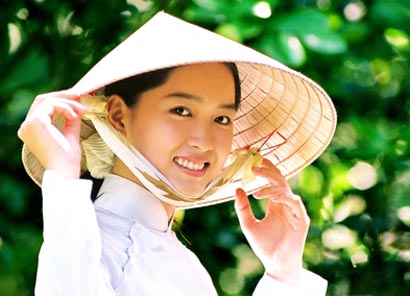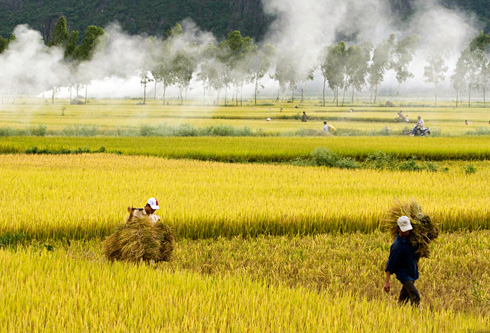

|
Peaceful country: With an annual growth of 8%, the Vietnamese economy is
increasingly attracting foreign investors. Once a battlefield, the country’s stability,
safety and integration are now highly appreciated. It is sure that Vietnam is a
promising destination for incentive tours and meetings of all kinds.
Amazing country: Vietnam offers a unique blend of cultures: indigenous and
foreign, traditional and modern, oriental and occidental,… making it an ideal destination
for your company’s top achievers to enjoy their incentive trip of a lifetime. Vietnam’s
charm lies in its unspoiled landscape, in its delicious food and in its friendly
people.
Fast-changing country: Efforts to improve the nation’s tourism infrastructure
can be seen all over the country. The upgraded transport system and newly-refurbished
hotel, restaurants, recreational complexes and conference centre make Vietnam an
emergent destination of comfort and excitement.
|
|
Official name:
|
Socialist Republic of Vietnam
|
|
Area:
|
331,210 sq km
|
|
Capital city:
|
Hanoi
|
|
Population:
|
91,51 million (July 2012 est.)
|
|
Local time:
|
GMT + 7 hours
|
|
Major cities:
|
- Hanoi Capital
- Ho Chi Minh City
- Da Nang, Hai Phong
- Ha Long
|
- Can Tho
- Hue
- Nha Trang
- Da Lat
|
Four great philosophies and religions have shaped the spiritual life of the Vietnamese
people: Buddhism, Christianity, Confucianism, and Taoism.
The Official National language is Vietnamese. Others are English, French, Chinese
(Cantonese and Mandarin) and Russian.
84% ethnic Vietnamese, 2% ethnic Chinese, also Khmers, Chams (a remnant of the once-great
Indianised Champa Kingdom) and members of over 50 ethno linguistic groups (also
known as Montagnards, 'highlanders' in French).
Spreading along the eastern edge of the Indochinese Peninsula, Vietnam covers a
land area of 330,900 sq.km of fascinating contrasts, from basaltic, fertile plateaus
in the central part to the misty beauty of Halong Bay, and from the flat, watery
land of the Mekong Delta in the south to the rugged Fansipan mountain range (3,143
m) in the north.
The country boasts a marvelous coastline of 3,260km dotted with white sandy beaches,
tranquil bays and colourful coral reefs, providing an easily accessible and favourite
destination for cruise liners sailing from Hong Kong or China to Singapore or Thailand.
Vietnam also shares land borders of 3,700km with Laos, Cambodia and China, along
which visitors can find an increasing number of crossings for their trans-Indochinese
exploration.
Vietnam has a tropical monsoon climate that varies significantly from place to place.
Each region has its best time for visiting: Hanoi from September to May with a pleasant
winter, Hue from March to August with a sunny summer and Ho Chi Minh City with warm
weather the whole year round.
The current population of Vietnam is 83.5 million with the vast majority being the
Viet ethnic group. There are 54 minority ethnic groups which make up 14% of the
population, with their ancestral origins coming from southern China, Tibet, Malaysia
and the Polynesian Islands.



During the late Neolithic Age, the ancient civilizations of Dong Son (northern Vietnam),
Sa Huynh (central Vietnam) and Dong Nai (southern Vietnam) were predominant in Vietnam.
Early history shows the first Vietnamese settled in the Red River Delta and developed
a feudal society during the Bronze Age. In the 2nd century BC, Chinese invaders
from the north conquered the Vietnamese kingdom, then called Au Lac, beginning 1,000
years of Chinese domination.
In 938, with the victory on the Bach Dang River, Ngo Quyen turned a new page in
Vietnamese history, establishing independent feudal dynasties for nearly 10 centuries.
The defeat of the Mongolian invasions in the 13th century is a great landmark of
this period.
In 1858, French troops attacked Danang, opening a colonial period for nearly 100
years. After World War II, President Ho Chi Minh declared Vietnam’s independence
on September 2nd, 1945.
In 1954, the Dien Bien Phu victory ended French colonialism in Indochina and was
ensued by the Geneva Agreement, under which the country was temporarily divided
pending a general election that never came about.
From 1956, American involvement in South Vietnam’s politics became deeper and deeper,
exacerbating the conflict between the North and the South and gradually leading
to the Vietnam War. In 1973, the Paris Agreement ending the war and restoring peace
in Vietnam was signed, and US troops were withdrawn. The country was reunified on
April 30th, 1975.
Since then, Vietnam has enjoyed independence and peace and entered a new era of
reconstruction, development and global economic integration.
A multi-cultural country with a long and proud history of 4,000 years, Vietnam is
a fascinating blend of the Orient and the Occident, the old and the new.
Despite the modernization process taking place day and night, villages with traditional
customs, festivals, farming methods, folk arts and ancient monuments still play
an important role in Vietnam’s present-day society. Visitors can discover the idyllic
charm of varied scenes of everyday life, from simple peasants in conical hats tilling
their paddy fields with rudimentary tools to innocent children riding and tending
water buffaloes at sunset or sunrise.
For visitors seeking hill tribe cultures, the presence of different minority groups,
e.g. the H’mong, the Thai, the Dao, the Tay, the Nung... in the northern highlands
or the K’ho, the Edeh, the M’nong, the J’rai, the Bahnar… in the central highlands
will bring amazement at their simple life style, from primitive villages clinging
to mountain sides to traditional customs being kept intact. In addition, the Cham
ethnic group in the coastal plains has made its complex of countless brick towers
in My Son a World Heritage.
For the gourmet, Vietnamese culinary art, acknowledged a superb cuisine worldwide,
is a wonderful balance of yin and yang featured in the harmonious formula of green
vegetables and fresh meat seasoned with mild spices.
Apart from their rich culture, the warm friendliness of the gentle Vietnamese people
also makes travels to Vietnam a well of joy beyond compare.